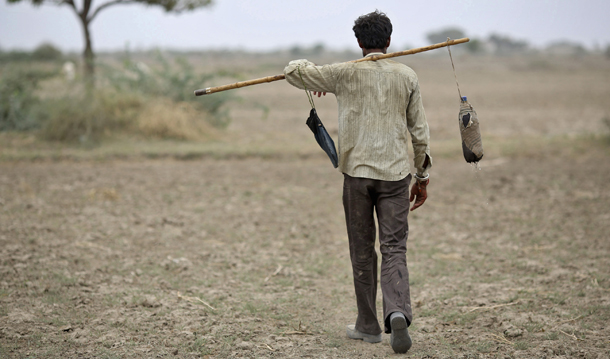i. The Squelch of the Sod
In this desiccated country, you find a child has a runny nose,
a tepid flower, slung like a pen, in his hand
His breathing growing, ponderously billowing,
as dust swallows his timeworn, ancestral land
How many years snuck by, as the squalls of July,
were unhanded, upon his bleak sorrows?
Each shower fell later than the last
then stopped, as he turned eighteen, aghast.
His nose grew parched, caked in dry bleeds
his throat, burned, moisture-less, in the rain-summer heat
The earth openly cried, bore its chest wide
starved, for there was no feast, such dearth–
No harvest, no shower, no relief, no welcome
deluge of gingham rains, zephyr licking the undulating fields
of rice, of cotton, of barley, or wheat.
He attempted to recall the old ways,
in blue-golden hours of light,
the squelch of the sod,
filled his last days, without a fight
so wet: posed no threat, no tawdry landlord,
to impose some sodden, exasperating debt.
His back broke, tilling the field, tottering behind his father.
No respite on offer, no rest for the wicked, none till sunset,
the golden hour; wont to be followed, by a simmering pyre
some woodsmoke.
Night fell, curtain call, carrying the scheduled thaw of flesh
beneath friendly, seraphic showers, (rarer by the year),
until it was time, for sleep, nothing beyond that hour.
Another morning, waking fresh,
dawn broke upon the empty land,
touched by the pitying hand, of
a passionless wind.
His father, a farmer, a mere man,
hung himself, from the ceiling fan.
ii.The Nightmare
Man of the house. Boy to (suddenly) man. Boy (furtively) inside man.
One night, he woke from a sad, little dream, catching his breath.
Calming himself, he lay awake in bed, face deadpan–
then a palm to his sweaty brow, he profusely wept.
No money, no food, no grain in the mill,
none to foot the mushrooming bills.
Between one sweaty palm, and the other torrefied,
all that was left,
were the remains of a future
one may only endure, can’t rejoice
bereft of quotidian joys–
instead, one accepted life’s chores
an inherited life, alas, couldn’t be ignored.
iii. The Decision
What to do but move to the city?
There he is, by the door. A family broken
makes him less giddy, than tall concrete.
A bell boy, at the Taj clutching at some currency
rigged out in costume, some remnant of the Raj
No real shoes, not much by way of cash,
though no self pity.
iv. Duty
He knows what he really wants.
Perennially, a distant mother on his mind,
always, always sick with worry, Mother
the eternal mourner, mourning forever, on behalf
of those who didn’t, over what’s been borne
lost, to time’s torrential assaults.
v. Call to Return
The phone rings, a village’s call. He answers,
offers consolations: Ma, I have a good feeling
despite everything.
Ponderously, he sets his hair
and combs away, his daily despair.
this winter, the sun will be low
this time, he has much to show.
He thinks, this October,
I’ll buy her a sari
and tell her not to worry,
about the cost.
~
Image: Representative image. Credit: Reuters

